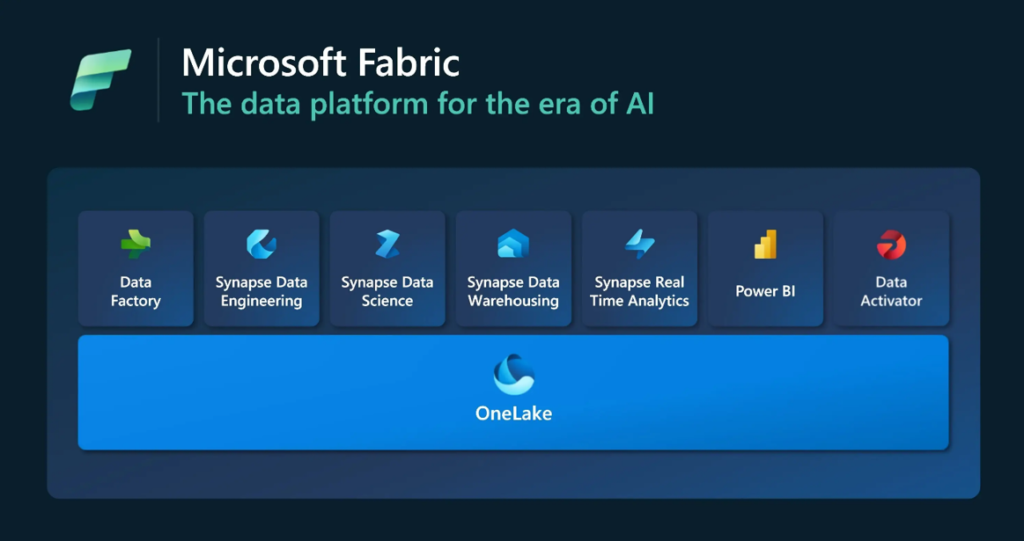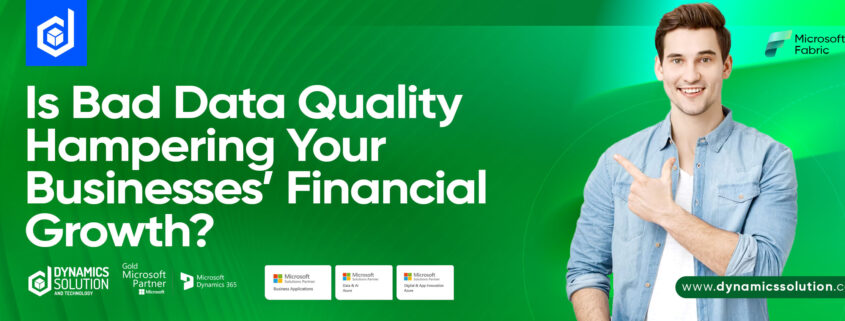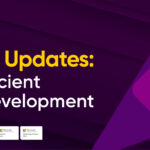Data collection and management remains a complex process across the multifaceted world of data analytics. As of July 2023, there were 5.19 billion internet users worldwide, which amounted to 64.6 percent of the global population. Of this total, 4.88 billion, or 59.9 percent of the world’s population, were social media users. However, only 1% of this big data processes in real and valuable data, driving informed decisions. It demonstrates the challenges with the wide range of data sources and formats that lead to the most meaningful insights for analysis.
Signifying an avalanche of data being produced and consumed at every moment, Microsoft Fabric offers a comprehensive solution for big data and processes it via a predictive analytics model. It captures all the different types of data, collaborates with it, and applies analytics to process large complex tasks.
This blog delves deep into the revolutionary powers of Microsoft Fabric as it weaves together the potential of AI with complex data systems to drive efficiency, productivity, and innovation.
Distinguishing Capabilities of Microsoft Fabric
Microsoft Fabric is an end-to-end analytics product that holistically views an organization’s analytics. Here is a look at some of the most distinguishing capabilities of Microsoft Fabric and how it can help businesses grow and thrive.
It is a comprehensive solution.
Every organization has its own unique data systems. Yet their goal is the same; processing data for driving meaningful information. Every analytics project is composed of multiple subsystems, requiring an array of capabilities, often requiring products with multiple vendors.
Integrating all these need-based products can turn out to be a complex, fragile, and expensive task. However, with the incorporation of Microsoft Fabric, customers can get access to a single solution that meets all their needs. With automatic integration and optimization, users can sign up within seconds and witness the experience of software as a service (SaaS).

Empowering every team with role-specific experiences, Microsoft Fabric allows data engineers, data warehousing professionals, data scientists, data analysts, and business users.
It comes with a multi-cloud data lake.
A data lake is a centralized data repository that allows organizations to store data in its raw form. Offering a flat architecture to store large amounts of big data, including structured data, unstructured data, and semi-structured data.
Microsoft Fabric’s distinguishing data lake is called OneLake, a SaaS, multi-cloud data lake that allows customers to seamlessly create, integrate, manage, and operate data lakes. Unlike traditional data lakes, customers no longer have to worry about data duplication or vendor lock-in concerns. Moreover, the entire data workload is automatically wired into OneLake, which organizes data in an intuitive data hub and seamlessly indexes data for discovery, sharing, governance, and compliance.
It offers open data formats.
Microsoft Fabric is deeply committed to a common open data format applicable for all workloads and tiers. This provides the users with a common open data format to load data into the lake, without having to separately ingest it. Customers no longer need to maintain copies of data for databases, data warehousing, business intelligence, or real-time analytics. Instead, just a single data copy will suffice.
Moreover, Microsoft Fabric provides extended data security, managed by OneLake. This layered security model is derived from Azure Active Directory (Azure AD) authentication (now Microsoft Entra ID) and ensures that users can keep their data safe while also reducing copies and minimizing complexity.
It is infused with the power of AI.
Azure Open AI Service is infused at every layer of Microsoft Fabric to help customers unlock the full potential of their data. Leveraging the power of generative AI, Copilot’s capabilities in Microsoft Fabric use conversational language to create dataflows and data pipelines, thereby generating visual results.
The conversational language is always customizable, building on the commitments of data security and privacy. The inclusion of Copilot in Microsoft Fabric inherits the organization’s security, compliance, and privacy policies.
It derives a data culture for everyone.
Microsoft Fabric integrates Microsoft 365 applications to help derive a data culture. For instance, Power BI’s deep integrations with popular applications like Microsoft Teams, PowerPoint, Excel, SharePoint, and OneLake are easily discoverable and accessible, allowing users to derive more value from data.
- Microsoft Excel can directly discover and analyze data in OneLake and subsequently generate a Power BI report.
- Microsoft Teams infuses data for users with their everyday work to embed channels, chat, and meeting experiences.
- Business users can present their data in Microsoft PowerPoint with live Power BI
- Microsoft Graph Data Connect (preview) unlocks insights on customer relationships, business processes, security and compliance, and people productivity.
In all, Microsoft Fabric is committed to providing a data culture for all employees as it turns apps into hubs for uncovering and applying insights.
The unified capacities reduce costs.
Microsoft Fabric is a singular analytics system, with computing capacity to manage complex data processes seamlessly. With an all-inclusive approach, customers can create solutions that leverage all workloads freely without any friction in data processing. The unified capabilities directly help the organizations reduce significant costs and improve profit margins.
Implementing an efficient and streamlined data engineering process eliminates redundant data storage and simplifies the process for a smart data engineering cycle. This reduces the implementation costs and storage costs, which enhances financial efficiency and productivity.
Groundbreaking Impact on Data Engineering and Data Analytics
The advent of Microsoft Fabric has completely revolutionized the BI, analytics, and data warehousing products to seamlessly access the functionality they enjoy.
- Standardized on open data formats, Fabri reduces data duplication and management, eliminating the need for data movement and refresh management.
- Multiple developer collaboration is enhanced with Git integration allowing seamless source control integration with development teams.
- Simplifying data discovery and management, Fabric allows users to centrally explore and build upon existing data projects, in a single workspace and ensuring data protection and compliance.
- A single pool of compute powers all Fabric experiences, reducing costs as unused capacity can be utilized by other workloads.
Embracing limitless possibilities, Microsoft Fabric has positioned Microsoft ahead of competing cloud and data storage solutions.
Dynamics Solution and Technology | Ushering a New Era of Data Management
The move to Microsoft Fabric represents a significant step towards redefining the data analytics landscape. Whether you are a seasoned data scientist or a business analyst looking to harness the power of data, Microsoft Fabric offers a comprehensive solution that simplifies complex data tasks.
Nevertheless, businesses require the expertise of certified professionals for a swift implementation process. Dynamics Solution and Technology has earned a trusted name as a Microsoft Gold Partner, thereby becoming a reliable solution for your business.
Having earned a track record of satisfied customers across the globe, especially in the Gulf and Mena regions, our experts have the necessary skillset and expertise to analyze your business ecosystem and deploy the solution in a tailored manner. If you want to dive deeper into data analytics and visualization with Microsoft Fabric, contact our team today.
Transforming raw data into meaningful insights just became swift and smart!






